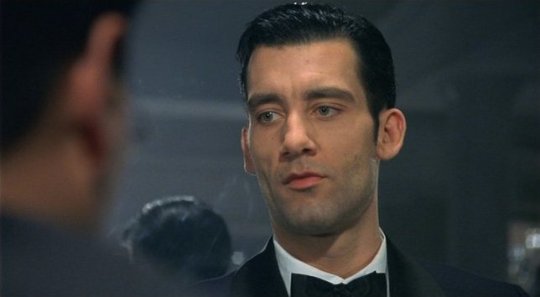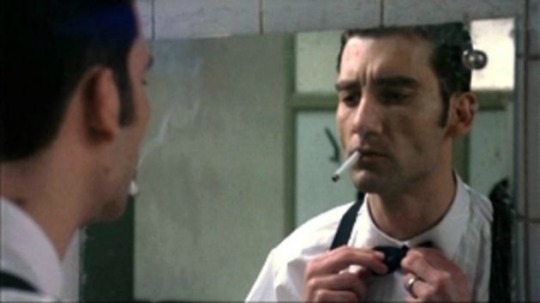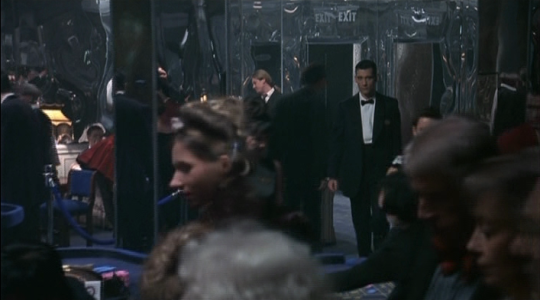The House Always Wins: "Croupier" and the Thrill of the Invisible Heist by Daniel Carlson
By Yasmina Tawil

Croupier almost shouldn’t work. Directed by Mike Hodges from a script by Paul Mayersberg, and starring Clive Owen in one of his first leading roles, the 1998 film is a gray, uncompromising number that doesn’t so much buck convention as it idly watches convention shuffle past. The story is murky, the character motivations are often vague, and it has several endings stacked against each other. Maybe that’s part of why, almost twenty years later, it still has a low profile. It didn’t make much money upon release, and stateside, it never made it to 150 theaters. It’s not even remembered much for Owen’s work, as compelling as it is: he gained more profile in a series of BMW ads a couple years afterward, followed by Gosford Park, Closer, and King Arthur, which really set his trajectory. Nor is it the first thing people mention when talking about Hodges. That honor usually goes to his shotgun-blast debut, 1971’s Get Carter. (Interestingly, Croupier remains, to date, Hodges’ penultimate film. He’s only made one since, reuniting with Owen in 2003 for I’ll Sleep When I’m Dead.) Yet despite the film’s minor status, it remains a quiet little masterpiece, as well as a standout in the loosely defined “casino/heist/con game” genre. It’s worth seeing and exploring precisely for the reasons it never caught on with audiences: namely, its stubborn refusal to play by the rules.
The first thing Croupier does is disabuse the viewer of any notions they might have about the glamour or allure of casino life, or of movies about same. When Jack Manfred (Owen) takes a job as a croupier — a dealer — in a London casino, he does it mainly as a favor to his father, a hustler back in South Africa who sets Jack up with the gig to help Jack support himself while he works on a novel. The casino in the film is ugly and run-down, its mirrored surfaces tarnished with age and rot, as if everything was wiped down with a soiled rag before cameras rolled. Bland fluorescent lights overhead give the room an institutional feel, and the tables are all a little small and overused. The result is that the casino feels like what it is: a place where delusional dreamers go in their hour of need. Most films about casinos eventually get around to discussing their heart of darkness, of course. Scorsese’s Casino uses them the same way he uses the mob, as something that proves alluring to people who don’t know any better, then slowly kills them. Owning Mahowny is about addiction and control, and the casino is the delivery device for the drug of choice. But those films (and others) also go to the effort of displaying the allure of the gambling hall as it appears to fresh eyes, all bright colors and high times. They make the place look as inviting as it would to someone coming in off the street. Croupier, though, never does this. The casino is shot in tight, direct frames, as if Hodges can’t wait to get out of there, and there’s never a word about winning big or beating the odds or making impossible dreams come true. It’s dull, and ugly, and inhospitable. As a result, the place feels exactly as depressing and uninviting as it truly is. Hodges never bothers with the fantasy, but instead goes straight for the reality.
There’s also the man at the center of it all: Jack, an aimless and somewhat glum person with no real goals or drive. He doesn’t like cheating or corruption — he refuses to gamble, even when it’s just a game of cards with friends — but he’s not a crusader. When he catches a coworker cheating, he threatens to report him not out of obedience to a higher moral standard, but because Jack’s own job would be in danger if the bosses caught the cheater and realized Jack knew about him, too. He’s prim, in his way, but pragmatic. In fact, he’s not driven by anything other than his basic desire to observe people. Although he originally takes the job to stay afloat while working on a contract novel about soccer, he finds himself making mental notes and then physical drafts for a new narrative about a croupier, modeled after the same cheating coworker he threatened to bust. The plot itself unfolds elliptically, slowly, seeming to move around Jack without actually involving him. This is not an accident. In an interview a few years after the film’s release, Mayersberg said, “I wanted a construction that in a way defied the basic film narrative logic. Jack is a protagonist who has no aim. … He does nothing that is intentional.” Owen strikes the right note here, too, between reserved and insecure. He’s not as removed from human understanding as Travis Bickle, nor is he just hiding behind anxiety. Rather, Jack views himself as superior to his environment and colleagues, and Owen captures that kind of bored breeziness perfectly. One of Jack’s mottoes is “Hold on tightly, let go lightly”; Owen’s an expert at being involved right up to the point he decides to bail.
The ugliness of casino life and the aimlessness of Jack’s personal and professional lives merge in the film’s biggest inversion of the genre: namely, its flitting depiction of the story’s central crimes, which take place on the fringes of the action and require focus to even notice. While he’s out shopping one day, Jack is approached by Jani (Alex Kingston), a high roller who’d played at Jack’s table at the casino just a few days earlier. They strike up a friendship borne of mutual admiration for their respective skills, and for their shared background — she’s also from South Africa — and before long, Jani tells Jack her tale of woe. She’s in deep with the wrong people, and she needs Jack to look the other way on the night some of her acquaintances plan to rob the casino. Not even that: all he has to do is take a slight beating from a shill who’s going to pick a fight with him, and in the distraction of that chaos, the robbery can take place. When the event finally happens, we barely even see it. Hodges gives us a glimpse of men holding guns as security doors slide shut, but that’s all. We don’t even know if it was a success or failure until later. Jack’s complicity in this act becomes the final step in his transformation into the croupier avatar of his novel. The focus here is not on the crime, or how it’s done, or even who it will benefit, but rather, on the feelings and deeds of one man involved in one tangential part of it. Crime is something that happens around Jack, but never to him. He might allow it to happen by inactivity, but he doesn’t encourage it or assist in its execution.
Yet that’s not the entire film. Not even close. Those subversions and plot points follow Jack’s evolution from aloof author to smug dealer he never thought he’d become, but they only tell the surface story. Croupier has another film underneath: the hidden tale that’s happening right under Jack’s nose — and ours — anchored by three women whose actions he never really sees or understands. This is what really makes Croupier so riveting: the sense that we’re just one revelatory moment away from seeing the truth, even though that moment never comes.
Each of those women plays a greater role in the events around Jack than Jack himself does, and he’s mostly oblivious to it. There’s Bella (Kate Hardie), a fellow croupier with a past as a call girl. Jack regards her as a broken object to be examined, and he sleeps with her almost as if he can’t think of a reason not to. That backfires when Jack’s girlfriend, Marion (Gina McKee), finds out about the affair from Bella herself. Bella swings by one evening after being fired for using drugs to deliver the knockout blow — ”Your boyfriend fucked me, smoked my dope, then shopped me” — leaving Marion to wonder what’s happening to Jack. Yet Jack didn’t report Bella for smoking pot, and we don’t learn for certain who did, though Hodges leaves a few bread crumbs. Rather, the Marion-Jack relationship is in place so we can see just how cruel, cold, and thoughtless Jack is toward her. He knows she loves him, and he mostly likes her, though he lacks the courage and decency to let her go lightly. A former police detective now doing undercover security at a department store, Marion finds out about the planned robbery via a message Jani leaves on Jack’s answering machine. (This is the kind of galactically idiotic thing one should not do when planning a major heist, but then, the plot needs a wheel on which to turn.) It’s Marion who passes that information along to her friends in the London police, but more importantly, it’s Marion who decides to stay with Jack even after he refuses to admit to his burgeoning secret life. It’s as if she doesn’t have the energy to move on, and though she’s resigned herself to a half-loved life, she takes action in her own way to damage the woman she thinks may have taken her Jack.
Which leaves Jani herself, a master manipulator who plays Jack from the first time she sits down at his table. It’s not that Jack never doubts her story, either. When she asks for his help, she’s sporting a black eye, purportedly from her disreputable lenders. The next time he sees her, it’s gone, and he comments slyly that it’s “cleared up nicely.” But he’s more curious than offended, and he goes along with her plan almost because he tells himself he’s just an observer, and it’ll make good copy for his book. Her true motives aren’t hard to suss out, and even her connection to Jack’s father isn’t a total surprise — in a mystery, there are no extraneous players — but Jack’s pride and solipsism blind him to any but the biggest or most reckless of her actions. He’s the star of the picture, but the story is really hers.
This is, again, where Owen’s graceful performance comes into play. He has the restraint to play someone arrogant and cold, and the bravery to be both the hero and the patsy in the same story, depending on how you look at it. It’s the kind of performance he’d return to in Closer and Inside Man, smooth and cool as glass. He’s also got just the right touch for the extensive voice-over, and he acts against it without overdoing it. According to Mayersberg, Owen won the role on the strength of his ability to anticipate these moments of duality and split presentation — Jack silently sitting or working while he narrates his thoughts — and when he tested for the role, he “left gaps which looked wrong for the scene but right for the voice-over. The voice-over made or broke the film.” That’s true, too. Far from being a crutch, or a device that disappears after the first act, the voice-over is the perfect tool for the film. It brings viewers into Jack’s world, the world of a lonely and not particularly happy author and observer of people, and it puts upon them a degree of complicity in what’s happening.

That’s the key to Croupier’s power, and one of the reasons it spawned so few imitators: the viewer becomes an unwitting accomplice in the anti-hero’s transformation. There’s no way to gain any distance from the film, or hold it at a remove. Rather, watching it means being seduced by it. We can tell ourselves we’d never be as cold and abusive as Ace Rothstein, but who’s to say we wouldn’t stand by like Jack and cause suffering through our inactivity or hesitation? We think of ourselves as above average, of having been smart enough to really figure things out. Croupier tears a hole in that notion.
The film is a wonderful, intricate artifact. You can almost feel its twists and ridges as you run your fingers along its spine. It’s a story of nested narratives and oblique characters, all crossing each other in a gambling hall whose endless mirrored walls suggest infinite possibilities and multiple versions of the same people walking through each other. It’s a study of the separation from reality created by the plasticized world of escape through desperate gambling. Money, already an object dependent on its holder for meaning, is further abstracted and turned into a little plastic chip, to be stacked with its fellows or scraped into a bucketed abyss below the table. Everything becomes a representation of itself, and human beings become unreal, imaginary, valued only for what you can get from them. It doesn’t matter where the ball drops on the roulette wheel. Every number is the same.


